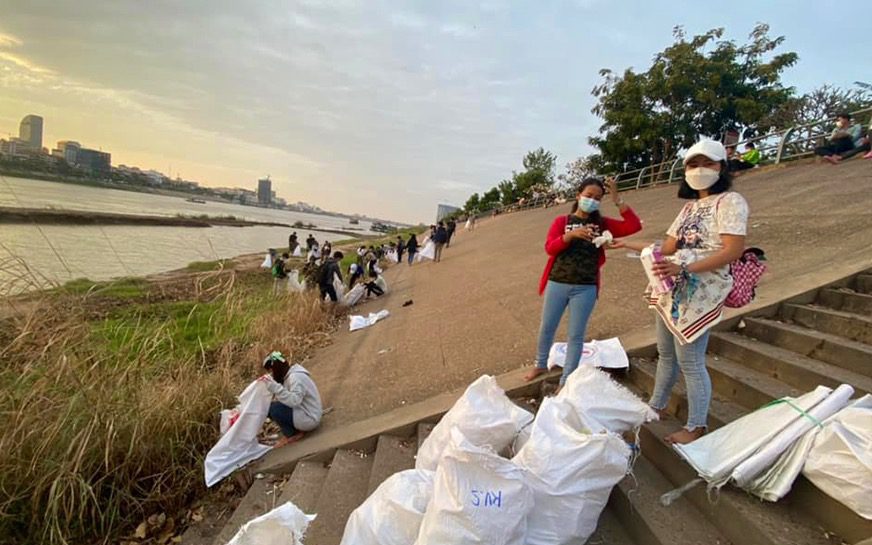Every Sunday, a group of nearly 20 people bring bags and gloves to the Phnom Penh riverside.
From the Chroy Changva bridge to the Sokha hotel, a distance of nearly 2 km, a stretch of riverbank fills up in the evenings with people walking, sitting in groups and relaxing, accompanied by the river and many food stalls.
The riverbank quickly gathers litter — plastic bags, cans and packaging that tumble down the bank.
San Daravit, 30, has been calling on people to pick up trash in that area every week. He has been doing the cleanups for two months now.
Every week, between 15 and 20 people join him.
“I saw some behavior — some of them would lay on mats, they would sit and then shake their mats and walk away. Others, they bring a plastic bottle, they sit on the riverbank, and when they go, they leave it, or they throw it to the bottom,” Daravit said. “We want to change the attitude of that place.”
He doesn’t want to see the Mekong river polluted, he said.
“This place, the water goes up and down. When it comes up, do you see? It’s floating. When it goes down, the garbage floats to the bank,” he said.
Daravit said he spends about $100 a week to buy bags, gloves and food. He said he is receiving some donations, but they have not been enough to cover expenses.
While collecting garbage, the group talks to visitors and vendors on the bank.
Savoeun Kim Chantharo, a medical student, said he had joined the cleanups twice now.
“We ask the vendors for advice on disposal,” the 25-year-old said. The group also speaks to visitors eating on the riverbank. “If they have garbage, we will ask them, ‘Can you throw your trash in this? Do you have any garbage to give me? And can you pack up the garbage and take it into the bin?’”
Phnom Penh produces 3,000 tons of trash every day, including 600 tons of plastic waste, according to the Environment Ministry. A recent study measuring plastic in the rivers said 200 tons of the city’s plastic waste could be flowing into the rivers every day.
The city has taken some measures, including introducing a fee for plastic bags at supermarkets, and asking residents to sort their trash by type.
For beverage seller Thong Sokhon, the volunteer cleanups at Chroy Changva have already made a small difference to visitors’ attitudes.
“It’s looking good,” Sokhon said, adding that she always properly disposed of her own trash.
Mao Buntha, Chroy Changva’s commune chief, expressed his appreciation for the cleanup activities, saying officials also wanted greater awareness of environmental issues.
“Good! It’s social work. We know that their involvement is right. It is necessary to have young people cultivate a conscience. Participating in the environment is very good, the youths can set an example. If they participate, we will succeed as well,” he said.
Officials have also been educating vendors and visitors along the riverbank, he said.
“But the vendors always change, which is our difficulty,” Buntha said, adding that officials were considering imposing fines.
The previous activities of Daravit, the organizer of the Chroy Changva cleanups, have faced some trouble with authorities. In 2019, a Khmer New Year event to collect trash in the polluted Boeng Trabek canal was stopped by authorities for not asking proper permission.
City Hall spokesperson Met Measpeakdey said at the time that the area was too unsanitary for a gathering, and the volunteers were using an abandoned raft without permission.
“Our country has laws. It was a public event and our brothers used the homemade raft that was built and left there without making a request,” Measpeakdey said in 2019. “How does this reflect on us? This is the lesson we want to impart: We cannot just do anything — [like] use a raft belonging to others to hold a ceremony without asking without informing and seeking permission from others.”
Daravit said there was still a long way to go to change attitudes.
“We try to ask for cooperation from the vendors over there. We try to promote it along the bank repeatedly,” he said. “We hope that if nine weeks are not enough, we will do more until there’s a change and participation from others.”
He is also working to clean garbage from the coasts in Preah Sihanouk and Koh Kong, and hopes to expand his group’s cleanup activities from Chroy Changva to other parts of Phnom Penh.













